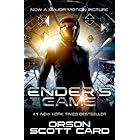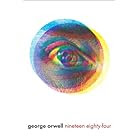This morning Amazon reminded me of what matters in Science Fiction and why it is not useless fantasy but a very serious literary genre that is able to raise deep existential issues and make us think.
Here is what I got in my email box:
Just four book, two historical "classics", Orwell's Animal Farm and 1984, and two "moderns", both winners of numerous awards, Joe Haldeman's The Forever War and Orson Scott Card's Ender's Game.
It so happens that two of those books are my all-time favorites (Orwell's) and the other two are on my TBR list - I just had samples downloaded to my Kindle...which goes to show how effective Amazon's marketing is.
Just to show you why these four books raise fundamental issues, here are excerpts of the book descriptions. Please note I've just retained the phrases that refer to the issues raised and italicized the high points:
Ender's Game: "In order to develop a secure defense against a hostile alien race's next attack, government agencies breed child geniuses and train them as soldiers. A brilliant young boy, Andrew "Ender" Wiggin lives with his kind but distant parents, his sadistic brother Peter, and the person he loves more than anyone else, his sister Valentine...Ender's skills make him a leader in school and respected in the Battle Room, where children play at mock battles in zero gravity...Yet growing up in an artificial community of young soldiers Ender suffers greatly from isolation, rivalry from his peers, pressure from the adult teachers, and an unsettling fear of the alien invaders." As the Amazon.com review put it: "Yet the reason it rings true for so many is that it is first and foremost a tale of humanity; a tale of a boy struggling to grow up into someone he can respect while living in an environment stripped of choices." (italics added)
The Forever War: "... a science fiction classic that chronicles the life of William Mandella. Due to the time distortion associated with deep space travel, he is present during both the first and the last battle of a thousand year old conflict with the alien Taurans. A masterpiece of not just science fiction, The Forever War illustrates the futility of all wars and their effect on the human soul." (Italics added) As Iain Banks put it, this is a war novel that happens to be science fiction.
Animal Farm: "...classic satire of the Russian Revolution is an intimate part of our contemporary culture. It is the account of the bold struggle, initiated by the animals, that transforms Mr. Jones's Manor Farm into Animal Farm--a wholly democratic society built on the credo that All Animals Are Created Equal...The climax is the brutal betrayal of the faithful horse Boxer, when totalitarian rule is reestablished with the bloodstained postscript to the founding slogan: But some Animals Are More Equal Than Others." (Italics added)
1984: "... a rare work that grows more haunting as its futuristic purgatory becomes more real. Published in 1949, the book offers political satirist George Orwell's nightmare vision of a totalitarian, bureaucratic world and one poor stiff's attempt to find individuality. The brilliance of the novel is Orwell's prescience of modern life--the ubiquity of television, the distortion of the language--and his ability to construct such a thorough version of hell."
It may come as a surprise that Animal Farm was included in this short-list of popular classic science fiction - it is more fantasy and satire than anything else, but it certainly uses the same Orwellian approach to novel-writing: logically extending to its extreme, violent version an observable current trend in human society, which is exactly what he did for 1984. And that is what makes Orwell's writing so effective and frightening. You recognize the world he describes, and he forces you to think through all the implications of what is happening.
The underlying message is this: if you don't stop the trend, that is what will happen. Hell on earth.
That strong warning is at the heart of the other two books as well: the perennial futility and pointlessness of war (The Forever War), the challenge of growing up, of becoming a just person in a world ridden with small-minded jealousy and pettiness (Ender's Game).
Yes, in my view, good science fiction, like good climate fiction, is all about alerting the readers to basic issues that threaten our continued existence on this planet. The debate is around political issues but also around bigger issues, like what is the meaning of civilization? What is at the heart of humanity?
These are very big questions normally associated with literary fiction. Yet science fiction addresses them too and does so with the additional dimension of unbridled imagination - no holds barred, everything is possible! And that makes good science fiction particularly suspenseful and fun to read...
Do you agree? Do you read science fiction and if so, why? What do you get out of it?
Here is what I got in my email box:
| |||||||||||||||||||||||||||||||||||||||||||||||||
| |||||||||||||||||||||||||||||||||||||||||||||||||
| |||||||||||||||||||||||||||||||||||||||||||||||||
Just four book, two historical "classics", Orwell's Animal Farm and 1984, and two "moderns", both winners of numerous awards, Joe Haldeman's The Forever War and Orson Scott Card's Ender's Game.
It so happens that two of those books are my all-time favorites (Orwell's) and the other two are on my TBR list - I just had samples downloaded to my Kindle...which goes to show how effective Amazon's marketing is.
Just to show you why these four books raise fundamental issues, here are excerpts of the book descriptions. Please note I've just retained the phrases that refer to the issues raised and italicized the high points:
Ender's Game: "In order to develop a secure defense against a hostile alien race's next attack, government agencies breed child geniuses and train them as soldiers. A brilliant young boy, Andrew "Ender" Wiggin lives with his kind but distant parents, his sadistic brother Peter, and the person he loves more than anyone else, his sister Valentine...Ender's skills make him a leader in school and respected in the Battle Room, where children play at mock battles in zero gravity...Yet growing up in an artificial community of young soldiers Ender suffers greatly from isolation, rivalry from his peers, pressure from the adult teachers, and an unsettling fear of the alien invaders." As the Amazon.com review put it: "Yet the reason it rings true for so many is that it is first and foremost a tale of humanity; a tale of a boy struggling to grow up into someone he can respect while living in an environment stripped of choices." (italics added)
The Forever War: "... a science fiction classic that chronicles the life of William Mandella. Due to the time distortion associated with deep space travel, he is present during both the first and the last battle of a thousand year old conflict with the alien Taurans. A masterpiece of not just science fiction, The Forever War illustrates the futility of all wars and their effect on the human soul." (Italics added) As Iain Banks put it, this is a war novel that happens to be science fiction.
Animal Farm: "...classic satire of the Russian Revolution is an intimate part of our contemporary culture. It is the account of the bold struggle, initiated by the animals, that transforms Mr. Jones's Manor Farm into Animal Farm--a wholly democratic society built on the credo that All Animals Are Created Equal...The climax is the brutal betrayal of the faithful horse Boxer, when totalitarian rule is reestablished with the bloodstained postscript to the founding slogan: But some Animals Are More Equal Than Others." (Italics added)
1984: "... a rare work that grows more haunting as its futuristic purgatory becomes more real. Published in 1949, the book offers political satirist George Orwell's nightmare vision of a totalitarian, bureaucratic world and one poor stiff's attempt to find individuality. The brilliance of the novel is Orwell's prescience of modern life--the ubiquity of television, the distortion of the language--and his ability to construct such a thorough version of hell."
It may come as a surprise that Animal Farm was included in this short-list of popular classic science fiction - it is more fantasy and satire than anything else, but it certainly uses the same Orwellian approach to novel-writing: logically extending to its extreme, violent version an observable current trend in human society, which is exactly what he did for 1984. And that is what makes Orwell's writing so effective and frightening. You recognize the world he describes, and he forces you to think through all the implications of what is happening.
The underlying message is this: if you don't stop the trend, that is what will happen. Hell on earth.
That strong warning is at the heart of the other two books as well: the perennial futility and pointlessness of war (The Forever War), the challenge of growing up, of becoming a just person in a world ridden with small-minded jealousy and pettiness (Ender's Game).
Yes, in my view, good science fiction, like good climate fiction, is all about alerting the readers to basic issues that threaten our continued existence on this planet. The debate is around political issues but also around bigger issues, like what is the meaning of civilization? What is at the heart of humanity?
These are very big questions normally associated with literary fiction. Yet science fiction addresses them too and does so with the additional dimension of unbridled imagination - no holds barred, everything is possible! And that makes good science fiction particularly suspenseful and fun to read...
Do you agree? Do you read science fiction and if so, why? What do you get out of it?




Comments